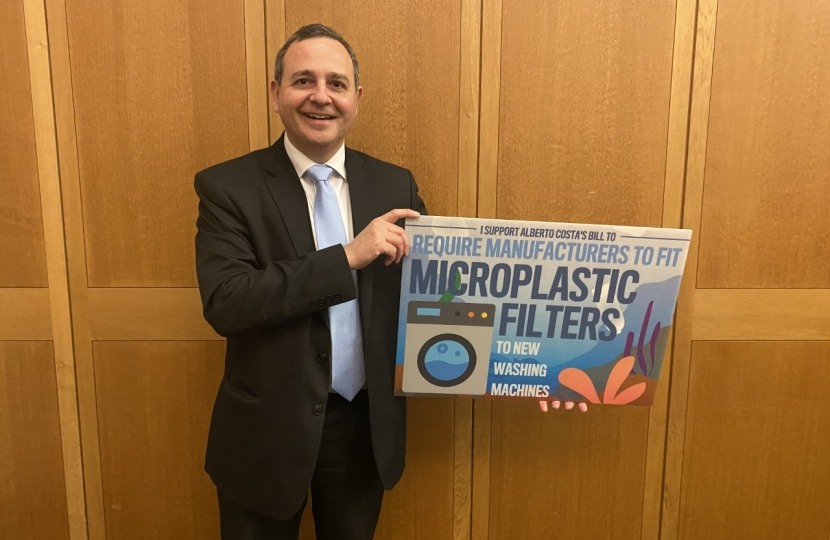
South Leicestershire MP, Alberto Costa, is planning to progress his landmark Microplastics Bill in Parliament on Friday 18th March. The Bill, which has cross party support, was unable to progress earlier in the year as Parliament unfortunately ran out of time. With the Second Reading this Friday, Alberto hopes to give a final push to progress the Bill.
The MP’s Microplastic Filters (Washing Machines) Bill would require washing machine manufacturers to fit microplastic-catching filters in all new domestic and commercial washing machines. The Bill also aims to raise awareness of the polluting effects of microfibre plastic released from laundry on our rivers and seas.
All clothes and garments shed what are known as microfibre plastics. Microfibre plastics are tiny fibres which shed from our clothes during the wash cycle. Microfibre plastic pollution is one of the most pervasive and preventable forms of microplastic pollution with 35% of total microplastics released into the environment being shed from clothing.
Research led by the University of Plymouth has found that one 6kg wash can release up to 700,00 microfibres. Due to their size, they are too small to be caught by standard washing machines and can end up in the wastewater system where they are either caught, remain in sewage sludge which can be spread onto growing crops, or released into river and marine environments.
Alberto, who is Chairman of the All-Party Parliamentary Group (APPG) on Microplastics, introduced the Bill to encourage the Government to work with washing machine manufacturers to fit standard filters in all new domestic and commercial machines.
Alberto has been working with the National Federation of Women’s Institutes who are the APPG on Microplastics Secretariat. Since 2017, the WI have been working on a campaign called ‘End Plastic Soup’ which aims to raise awareness of the effects of the release of microfibres from laundry.
With the technology for this solution is already available, adding filters into a washing machine would be an effective way to reduce microplastic pollution.
There are companies already working on filters. A system that can be retrofitted to existing washing machines and does not need replacement cartridges has been created by the British company Matter. The device, called Gulp, is connected between the outflow pipe and the drain and traps the fibres in a container that is emptied every 20 washes.
Xeros Technology Group, who focus on providing the technology to manufacturers to integrate into washing machines, have a solution called XFiltra that can capture more than 90% of microfibre plastics from the wash cycle. The company Grundig, who are part of Beko Plc, have recently released a new machine with a microfibre-catching filter. The in-machine filter also catches 90% of synthetic fibres from the wash cycle.
Alberto said: “I am looking forward to progressing this Bill as Parliament ran out of time for it earlier on in the year. I am very grateful for all the support I have received for my Bill from colleagues from across the House of Commons. Microfibres are a huge problem that the Government need to tackle. With the technology already available for this solution, I am urging the Government to implement this change quickly.”
Alberto is encouraging the Government to work with other manufacturers to produce standards for a mandatory filter in all new machines which would dramatically reduce the amount of microplastics in our environment.
The Environmental Audit Committee have recently published a report on water quality in rivers which found that no river in England is free from pollution and that microplastics contribute to the ‘chemical cocktail’ which poses a risk to the environment and to human health.
Alberto added: “This is an opportunity for the UK to become world leading in tackling the effects of microplastics. Businesses and consumers also have a responsibility and more awareness needs to be raised in this area, so I do look forward to continuing to raise this matter in Parliament in the hope that real change can be achieved soon.”
